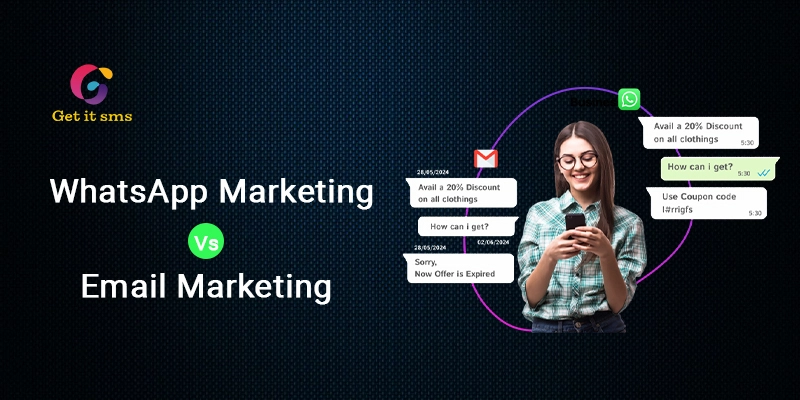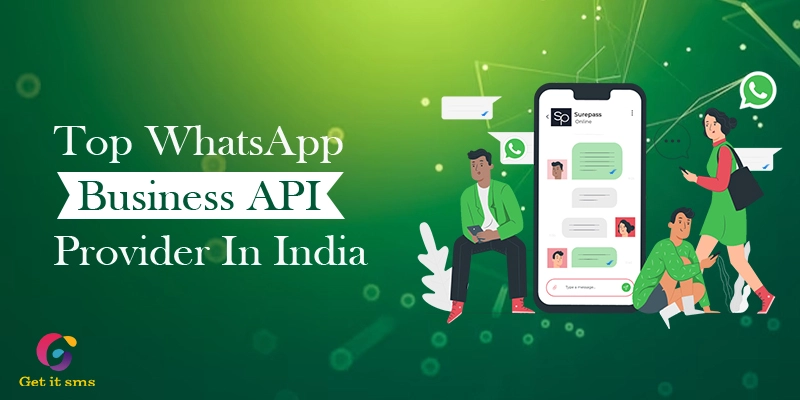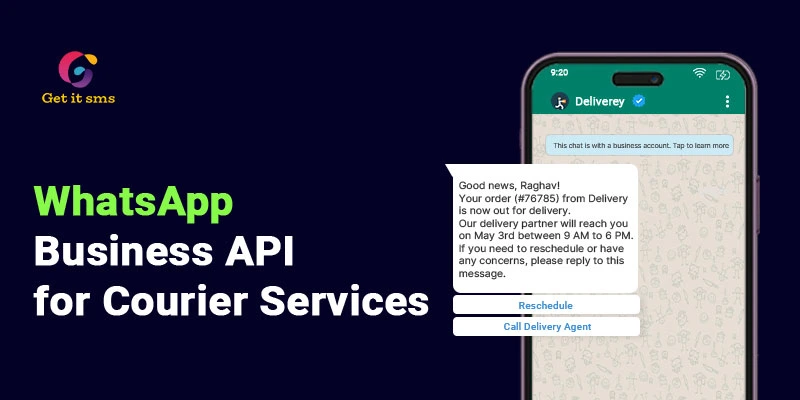Want To Send Bulk SMS?
If yes, then test our service for FREE.
Get a 1 Month Free Trial of WhatsApp Business API
WhatsApp marketing vs. email marketing, which one is the most effective approach? WhatsApp marketing is a valuable tool and puts consumers on the same platform. But the suspicion is which marketing method is more practical and efficient?
Companies are willing to operate various communication channels to create closer connections with their target customers. In this regard, Email and WhatsApp are well-known conversational platforms.
However, email marketing is one of the most effective and traditional methods in the current marketing digital world. They remain to sell and raise brand consciousness for the competitor since its creation and functionality have not waned.
However, the addition of WhatsApp into the combination has reignited the WhatsApp vs Email for business discourse. Areas like WhatsApp for instance, because its opening rate reaches 98% and consumers look for it fast and appealingly. This makes it a good option for regular email marketing.
Therefore, which of the two is more effective; WhatsApp marketing or email marketing?
Which one is a more helpful marketing channel? This article will help you to understand how well both approaches work and explain which suits your industry or marketing plans best.
What is Email Marketing?
Email marketing could be more innovative, but use it to advertise your business products and services effortlessly. As this is one of the old strategies available, companies can frequently use it because it is cost-effective and hassle-free.
But the most useful thing about this marketing is that industries can quickly get the emails of consumers and opportunities with mailboxes and turn them into sales and clients. Unlike some of the new trends in marketing like social media and WhatsApp relying on interaction, email marketing relies on interest; therefore, this is a lean time-consuming process.
This is the oldest form of Internet marketing method that involves using Email to convey messages, promotional information, or any update that a business wants its audience globally.
Emails are effective in connecting with current and potential customers. They facilitate relationships and quick actions like making purchases, signing contracts, and many others. Comprehensive Email marketing is a powerful method of communicating with your audience, generating leads, and creating brand awareness.
Nevertheless, Open rates for email are as low as 20%!!! There needs to be a debate about how influential your Email is; when customers are not reviewing your mail, it is not worth sending it.
Currently, users open their Emails just to see business emails, verify OTPs, and verify emails for verification purposes. That’s it. Emails are enough to convince customers to make their own decisions.
There WhatsApp comes into the picture.
Advantages of Email Marketing
- Customers can agree or disagree, but that is what email marketing is – the creation of an emotional bond with the audience of the newsletter. In the end, they are prompted to make an effort because the format possesses a feature of storytelling.
- Compared with other marketing techniques, this is positively cost-effective. Businesses can efficiently target their customers without paying a penny for promotions or direct Email.
- You can smoothly track your email campaigns, involving factors like open rates, click-through rates, and communication, to learn your users’ habits and enhance your technique.
- Email marketing helps you to categorize the customers about their interests and suggestions and you can also send them personalized messages in the same way. Hence, you can target customers right where they are in their communication process.
- A great bridge to interact with customers who move forward to get communication from your end. Your email marketing list will comprise the people who have counted themselves lucky for being subscribed to emails from you.
Disadvantages of Email Marketing
- Over the past years, subscribers have found themselves out of interest or simply bored by the numerous emails they receive from businesses.
- Your unsubscribers will determine the number and level of opens on the list, making it more challenging to gain more subscribers if the opt-out rates go high.
- Chances of lower engagement and click-through rates when you have to compete with a cluttered inbox and other distractions for the opt-in user’s attention.
- Emails may have the chance for messages to be caught in spam filters. If the receiver notices the message is spammy or irrelevant, it will automatically be sent to the spam folder.
- Bear in mind that your Email has to get past a subscriber’s spam list; this is a necessity if your Email is to end up in the target’s inbox. Matrics, including the quality of your email list, email service provider, and your business’s reputation, can impact your email deliverability.
- Failure to follow laws such as the CAN-SPAM Act in the United States implies fines and legal proceedings. Such laws require you to mention precise facts or details in your Email, such as unsubscribe links and contact details.
Now that we’ve covered the advantages and disadvantages of email marketing in the discussion of WhatsApp Marketing vs. email marketing, let’s look at its rival marketing strategy: WhatsApp marketing.
Consequently, marketing through the application has become more appealing as the application possesses a vast number of users including instant messaging features.
What is WhatsApp Marketing?
WhatsApp Marketing means the use of the most frequently used communication medium which is the WhatsApp Business for talking to individuals in any part of the world. This channel is operated to disseminate promotional content, offer customer support, and engage in one-on-one conversations. WhatsApp marketing is even utilized for the broadcasting of a message at a certain level.
This is a direct, immediate, and more intimate way of communicating with your customers. It may be using groups, broadcast lists, or even WhatsApp chatbots for easy management and quick response to customers.
Moreover, like in all instant messengers, there is the possibility to share media files like photos, videos, and documents through WhatsApp which enhances the overall usability of the application.
How WhatsApp works: Consider an example of a marketing campaign
Another example of the WhatsApp marketing campaign was in 2019 when Unilever ran the “I will get you back your beloved clothes” campaign in Brazil to inform people of the new fabric store of fabrics. The marketing team applies the posters and billboards around places to reach as many people as possible.
Using posters or billboards, the public is always able to see the product image and a WhatsApp contact number.
When customers send a message to the number, they are guided by the chatbot and also advised on how to wash their clothes.
Chatbots also introduce new products through audio notes, videos, and memes whereas WhatsApp is employed in the process as well. At the end of conversations, people achieve a whopping 50% discount on the fabric softener with free delivery.
As a result of the campaign, Unilever’s sales improved by 14x, and the product got 290,000 WhatsApp messages and 12000 new leads. WhatsApp marketing works due to the platform’s widespread usage and great engagement rates. As of now, WhatsApp has more than 4 billion active users, offering an impressive potential customer audience. This helps with real-time conversation, allowing fast responses and instant customer engagement.
One easy way to Start a WhatsApp Marketing is with a platform like Getgabs which is based on the WhatsApp Business API. The platform enables you to reach out to hundreds of thousands of WhatsApp users at a single touch, set up alerts, get the WhatsApp Blue Tick, Click on WhatsApp Ads, send WhatsApp Catalogs, collect payments within WhatsApp, and send retargeting campaigns to consumers.
Advantages of WhatsApp Marketing
- With WhatsApp, businesses can subscribe to a premium plan that can facilitate automation of operations through easier and faster communication with the users.
- It allows you to instant message customers in real-time, making it much faster to address their requirements and concerns. This will help them build trust because they are likely to experience calm and be listened to.
- WhatsApp marketing is popular in almost every country, so you can tap more significantly into global markets and guide a variety of customers. This makes the channel also beneficial for a person of any age or origin.
- WhatsApp also suggests group chats and broadcast lists to conserve time by sending WhatsApp Bulk messages to customers at the same time. This may also be recognized depending on customer choice, demographics, or shopping behavior to reach the right people.
- WhatsApp enables the added support of media, which allows the design of versatile marketing campaigns. The capability to share different formats helps to make more clever and exciting marketing factors that grab the audience’s attention.
- WhatsApp has increased conversion rates due to high open and response rates as compared to other techniques.
WhatsApp Vs Email For Business
Among WhatsApp marketing vs email marketing, which one will you pick for your business promotion? Well, to choose which channel is most beneficial for your business, it is important to know the following disparities between WhatsApp vs Email for business.
| Function | Email Marketing | WhatsApp Marketing |
|---|---|---|
| Communication method | More formal | More casual, conversational |
| Open Rate | 20% | up to 98% |
| CTR | 2-4% | 45-60% |
| Reactivity | Low | High |
| Communication Speed | Based on when the receiver opens emails to check the message | Immediately, businesses can know when the receiver reads the message and will show a blue tick. |
| Spam/Mail | Advertised emails often end up in the junk folder and go unnoticed | Any type of message will not come into the junk folder and will be received as chat messages |
| Multimedia Support | Most platforms only support images, text, and GIF files | Supports text, PDF files, videos, and images |
1. Message Open and Response Rates
The open and response rate indicates the percentage of users who opened your message or Email and responded to it. The campaign Monitor report says WhatsApp has a higher open rate of 98% than emails. This can be attributed to the fact that WhatsApp messages are fast, appropriate, and directly in touch with the recipients, hence making them open and equally reply to the message.
In contrast, email users typically encounter challenges such as messy inboxes and avoiding spam messages, which may lead to a lower open rate of 20%.
2. Click-through rate
The next parameter to differentiate between WhatsApp marketing and email marketing is the click-through rate. This is about the percentage of people who click on the link mentioned in your WhatsApp broadcast message of the emails sent.
WhatsApp has a click-through rate as well as a conversion rate in the range of 45-60%. The channel has a much better click-through rate due to its specialization, quick response with the help of its different pin features and directly engaging with the target audience.
On the other hand, email receivers often believe that external links have lower click-through and conversion rates of about two to five percent. The cause for this can range from security concerns to unwanted and unknown emails.
3. Junk & Spam
With Email marketing, emails can be opened to be flagged as Junk or spam and be deleted. This can be done either by your receiver deliberately or due to the inclusion of spam keywords in your subject line. But WhatsApp messages are not marked as junk or spam messages.
It also includes the blue-tick and the double-tick facility, with the help of which businesses learn whether or not their customers have received or read messages sent to them.
4. Resource Dependence
Resource dependence refers to what Email and WhatsApp marketing needs. Email needs a lot of work with the look and feel and the content on the contrary WhatsApp is informal and informal and less demanding. It is different from WhatsApp and as for sharing other messages, one is not limited by the file size of the message.
It suggests that WhatsApp marketing requires less effort as well as resources than email marketing.
5. User Responsiveness
The time spent on it per user is 40 minutes per day. Since the response rate of WhatsApp messages is near-immediate, users constantly look at their WhatsApp notifications more than twice an hour. Likewise, in the case of the user response rate which is exceptionally low for emails as compared to WhatsApp, just like WhatsApp, everyone opens the email to see the business emails and OTP verification.
That means that WhatsApp vs. email marketing is still relevant for business. Email is much more secure than WhatsApp. We do, however, understand that email marketing is still going strong, as we have talked about it already. Research informs that to date almost 82% of the companies continue to apply this type of marketing (Email) globally.
WhatsApp Marketing Vs Email Marketing: Which is Effective for Business?
Email marketing and WhatsApp marketing have several pros when it comes to immediate client interaction and brand promotion. WhatsApp offers fast, immediate, and resourceful talks, personalized content, high ROI, and selective email marketing propositions.
On the other hand, before sending emails, you can confirm or verify the email addresses to ensure they are not undelivered or labeled as spam.
It is obvious that WhatsApp marketing and Email marketing are two opposite ways of advertising, and which one is more effective depends on the business kind and the specialty. This does not mean that you are required to select one over the other marketing channel. If you want the best result for your business, you can make use of two channels to enhance and improve your business.
Let’s take an example to understand the concept better:
Consider a local restaurant looking to improve its consumer outreach initiatives. The restaurant might utilize Getgabs’ WhatsApp Business API service to include a simple click-to-chat WhatsApp button on its website. So, when website visitors click on it, the restaurant may send them rapid, urgent offers, such as a lunch special, to lure clients on short notice via WhatsApp. This method enables quick replies and fast interaction.
Meanwhile, the restaurant may employ email marketing to provide tales, recipes, and updates to consumers who want to connect more deeply. Email, after all, supports more comprehensive material.
In other words, in this scenario, using WhatsApp marketing and email marketing in the restaurant marketing strategy may be pretty beneficial. WhatsApp can immediately attract attention for unexpected sales, but email marketing may develop superior, long-term ties with consumers over time.
Promote Your Business on WhatsApp with Getgabs
As we discussed above, WhatsApp marketing vs. Email marketing evidence indicates that amongst currently available channels, WhatsApp offers the highest reach and interaction levels in the current challenging market environment. This is true, especially for companies seeking to expand beyond domains and borders. However, the process of brand promotion using WhatsApp might consume a considerable amount of effort for most business owners.
If you don’t want to experience any issues or if you wish to get directional cues, you can connect with Getgabs which is the most recommended and reputed WhatsApp Business service and visionary in offering proper workplace assistance in WhatsApp.
By now, Getgabs has been able to provide a great experience on how several businesses across varied domains including the real estate, travel, and education sectors have used WhatsApp to market their brands. You can make your own WhatsApp account at Getgabs to send promotional messages.
Frequently Asked Questions
Q1. Is WhatsApp marketing a good replacement for Email?
A. WhatsApp marketing is a more personalized method to target potential customers than email marketing. To make messages more interactive, you can include photos, videos, and gifs. Irrelevant mail can be automatically labeled as junk or spam.
Q2. How are WhatsApp messages more secure than Email?
A. Emails are only encrypted but not end-to-end while WhatsApp uses end-to-end encryption. That means that every message, that is created via email, will be encrypted in the communication history. However, all this is being relayed over the public network at the same time.
Q3. What is WhatsApp marketing?
A. WhatsApp marketing is the process of using the most utilized media communication platform, WhatsApp Business, to communicate with the end-user, market products, provide customer relations, and sell through live dialogues.
Q4. Which one is better: WhatsApp marketing vs Email marketing?
A. This has been said above, that there is no better technique. Based on our needs, we can combine both channels to generate additional profit for the company’s brands. It might be important to remember that email marketing is for long-form content and WhatsApp is for pre-access such as the interactive message.
Q5. Do we still need to use Email marketing for business?
A. Yes, despite this, you should still manage your email CRM platform. But to make from such a channel means blending it with WhatsApp marketing. Each channel has its unique purposes, but when taken together will provide more revenues for such a business.
Conclusion
Therefore, we have come across the contrast between WhatsApp marketing and Email marketing, as well as the two approaches’ advantages and disadvantages. Of course, WhatsApp marketing is perfect for the necessity of the instant and personal approach, at the same time, the Email is better because it is very individualistic and detailed.
WhatsApp vs. Email for business: which one to choose depends on your company’s behavior and business objectives. That however does not imply you select one of them at the expense of the other. While email marketing remains perhaps the most popular B2C platform, throwing a campaign on a messaging application such as WhatsApp delivers a far higher ROI in customer engagement, opening rates, and conversion.
But then again if one wants to get the best result why not use them together and take advantage of the strengths of the two platforms? Eventually, a balanced technique assures swift interaction and long-term relationship development for a robust marketing strategy.
Recent Posts







 within 24
Hrs +
60
Days Free API Panel
within 24
Hrs +
60
Days Free API Panel



